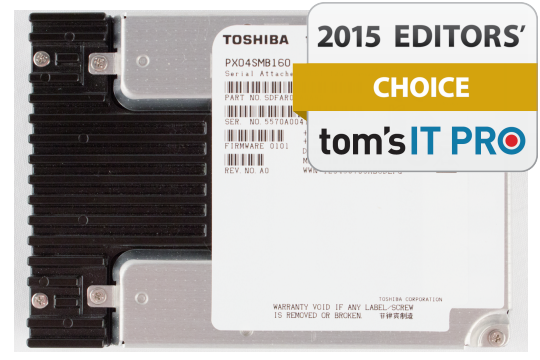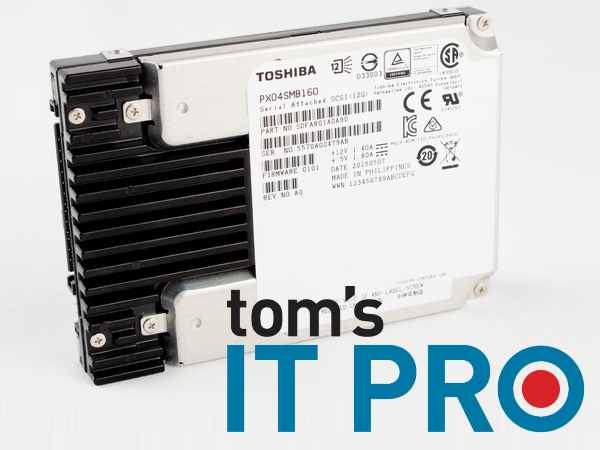Early Verdict
Toshiba's PX04S provides PCIe-like performance over the durable and resilient 12Gb/s SAS connection, making the PX04S the clear performance leader in the SAS segment.
Pros
- +
Consistent, class-leading performance, incredible power efficiency.
Cons
- -
Only available with a 15mm Z-Height.
Why you can trust Tom's Hardware
If you want to go fast, flash is the ticket. Confining flash behind the brick wall of SATA isn't the best solution, it isn't as fast as other interconnects and has hit a developmental dead end. We are at 6Gb/s SATA and that is where it stays -- there will be no 12Gb/s SATA.
SSDs shed the bonds of SATA and finally took flight when the industry transitioned to PCIe. The speedier connection provided explosive performance and the resulting PCIe SSDs are larger, faster and more efficient than 2.5" SATA SSDs. Unfortunately, PCIe SSDs tend to be inside the server, so any service or maintenance requires shutting down the server, which isn't ideal to say the least.
The only other interface that offers unbridled performance and connects through the PCIe pipe is SAS. Unlike 6Gb/s SATA, 12Gb/s SAS provides a wide enough freeway for SSDs to run at full speed. However, the first generation 12Gb/s SSDs weren't quite up to the task of utilizing the connection to its fullest extent.

Toshiba's PX04S provides PCIe-like performance over the durable and resilient 12Gb/s SAS connection, making the PX04S the clear performance leader in the SAS segment.
Toshiba's PX04S 12Gb/s SAS SSD barrels onto the scene promising gaudy PCIe-like performance statistics (up to 300,000 random read IOPS in our testing) paired with SAS goodness. SAS is back, and with a vengeance. Come along to Toms IT Pro as we clock this thing in our Toshiba PX04S SAS Enterprise SSD Review. (Psst... this is the fastest SAS SSD to ever hit our lab.)
MORE: How We Test Enterprise SSDsMORE: Latest Enterprise Storage News
Paul Alcorn is a Contributing Editor for Tom's IT Pro, covering Storage. Follow him on Twitter and on Google+.
Follow Tom's IT Pro on Twitter, Facebook, LinkedIn and Google+.
Get Tom's Hardware's best news and in-depth reviews, straight to your inbox.

Paul Alcorn is the Editor-in-Chief for Tom's Hardware US. He also writes news and reviews on CPUs, storage, and enterprise hardware.
-
dgingeri Given my experiences with Toshiba enterprise level HDDs, I wouldn't trust this thing with my data. I had over 1200 Toshiba 146GB 15k drives across my lab in 2010. Every single one of them died before they hit 3 years old. Fortunately, we didn't lose data in any case, but it was almost a full time job just swapping out drives and calling Dell for replacements for the next day. I will not trust Toshiba enterprise level hardware again. I wouldn't accept such reliability problems in consumer level hardware, let alone enterprise level.Reply -
jeff_sloan dgingeri, Seriously? Over 1200 hard drives failed before 3 years?Reply
You make it sound like that was ALL your drives in your lab, but I find it hard to believe there was a 100% failure rate, so how many Toshiba drives did you have total? How many of all brands together? -
captaincharisma @dgingeri you do realize they are talking about solid state drives and not mechanical hard drives right?Reply
considering you mentioned drives from 2010 i don't think toshiba made any SSD drives let alone have any hard driver under there name at that time -
YourLocal On a different note on the consumer side the only SSD that has ever died on me was a OCZ Vector 150. Luckily I bought it at newegg and was in the 30 day return period. They refunded me a little under $300 for a 480GB drive. So not only did it fail, but it failed in about 2 weeks.Reply -
dgingeri I am the admin of a test lab for server storage software development and for tape library testing. We have a LOT of hard drives. Just the performance department has 108 16 drive trays of FC storage. Over all three labs, I have approximately 600 FC trays. I also have around 400 SAS trays with 3.5" drives and about 150 SAS trays with 2.5" drives. Of the SAS trays, about 2/3 are just trays with SAS RAID controllers in the system, while the other 1/3 have their own RAID controllers or are attached to another tray with its own RAID controller. Many are partially filled, some are completely filled. I also have 90 Dell R910 systems with 13 or 15 2.5" SAS drives. I have configured and maintain every single one of those trays over the last 5 and a half years.Reply
Now, addressing these drives in particular: When my company released a new product 4 years ago, based on the Dell R910 and two MD1220 trays, along with a lot of other storage, Dell took the lowest bidder on the drives we needed, 146GB 15k SAS. The winning bidder happened to be Toshiba, which is still using the Fujitsu name at the time. The specific drive was the mbe2147rc.
Our first systems for testing came in with 13 drives in the node and 17 drives in each MD1220 tray, three months before release to the public. Less than 3 months after release, we started having issues with drives failing. In some cases, they even failed in such a way that it spiked power back through the backplane and killed nearby drives and the backplane. Three months after that, we started getting complaints from our customers on the reliability of these drives. I was having to replace these drives 3-6 at a time on our test systems after less than a year. The reliability was HORRIBLE. We started getting drives with the Toshiba name on them instead of the Fujitsu name, but the same model number. They had the same issue. After the one year point, we told Dell to specifically use the Seagate Saavio series drive because of these reliability problems. We also started using the Seagate drives for all replacements. In the end, we did a full recall on all customer drives to replace them with Seagate drives. It cost us a pretty penny. They did not, however, issue that recall for internal drives, and many drives made it to me to use as spare parts. I got an entire pallet of those drives, 12 in each case and 12 cases, from our service department. I used them all before the three year mark on these drives. I have gone through since then to make sure we don't have any left. I recent received a system from our Irvine office that was loaded with them, and hadn't been turned on for over a year, and they are failing like crazy now. I built it as a VM host with those drives in a RAID 6 set, only to have the set die twice now because of too many failed drives at once.
My estimate of 1200 is probably low ball, and yes, that was every drive that I have had in this lab except for that most recent system. All my 146GB SAS drives are now Seagate Saavios, and I had the first one of those die this past weekend. In that time, 4 years, I've replaced a confirmed 3008 (188 cases of 16 each) Seagate Constellation ES 1TB and 2TB and Barracuda ES 1TB drives from our FC sets, but better than half of those are still in service. Yes, I do go through that many drives, about 1500 per year. My budget reflects that. I also spend about $3000 per year on FC cables and $1000 on cat 6 cables.
There was indeed a 100% failure rate within 3 years of those horrible drives, many taken out by the drives next to them. The failure was always the same, failure of the central bearing, either seizing the drive or leaving it sounding like a pepper grinder when running. Many of the ones that seized were the ones that sent the power spike through the backplane to kill other drives. That mostly happened in the central node, where the drives were stacked in 4s. Either the top or bottom drive would be left running, but due to the system config, running in mirrored pairs, would leave the system unable to run and had to have the software rebuilt.
Our newest lines use Seagate Saavio 2.5" and HGST 3.5" drives for the best in reliability, trying to salvage our company's reputation on that matter. -
mapesdhs Your experiences do of course sound terrible, but what has any of that got to do with this SSD product review? Also, at the time, did you not contact Toshiba directly?Reply
I could equally well say that of all the conventional HDD brands I've dealt with, Fujitsu have been the most reliable, especially the MAX 15K series, but this means nothing when it comes to judging the merits of an SSD, consumer or otherwise. Over the years I've had plenty of bad Seagates, IBMs, etc., but one can't say an entirely different type of product should be avoided just because of what you've described.
If anything, I would be more interested to hear how Dell & Toshiba dealt with the failures from a support angle.
-
dgingeri The reliability of the manufacturer of one item always has influence on other items they manufacture. If they don't put enough effort into the reliability of one enterprise product, they it is likely they won't put that same effort into other products. A company attitude like that is also not likely to change over a short period of time, either. It's a company wide or division attitude and management decisions on production quality, not an individual product design, that is to blame for most product reliability issues. Usually the attitude and management decisions of one division doesn't affect other divisions. In this case, they're both from the enterprise product division, so they'll likely have the same reliability problems.Reply -
g00ey dgingeri; Your comments are appreciated but you do realise that you are talking about hard drives while the article is about SSDs? From a technical standpoint in terms of reliability and durability it is like comparing apples and oranges.Reply
Also, you write that if a company don't put enough effort into the reliability of one enterprise product, they are not likely to put that same effort into other products. We all know that the Seagate Constellation drives are, or at least have been utter sheit, as you confirm yourself from your own experience. But yet you are praising the Seagate Saavio as the best in reliability. If the Saavio is as good as you claim then how much effort did Seagate put into it?
The same could apply for a "good" manufacturer; amidst their line of excellent products they may on occasion release a piece of turd every now and then. -
Uilleam I'd have to agree with dgingeri.Reply
I've been a long time reader of Tom's since the 90's and have been a Computer Technician for 18 years.
Toshiba in my opinion is the worst Hard Drive made. Numerous times when Toshiba Laptops or other computers with Toshiba drives that would come into the shop and hear the customer articulate the symptoms I'd tell them their hard drive probably died. I'd say 80% of the time it was the drive. Usually the Click of Death.
Just because it's a Toshiba drive of any type I wouldn't trust it.
Other notable brands I wouldn't trust are:
Seagate (They do have firmware updates from time to time)
Maxtor
Samsung (They have good SSDs)
Fujitsu (Old Fujitsu used to be really good)
Brands I've had the best luck with are:
Western Digital
Hitachi
IBM
